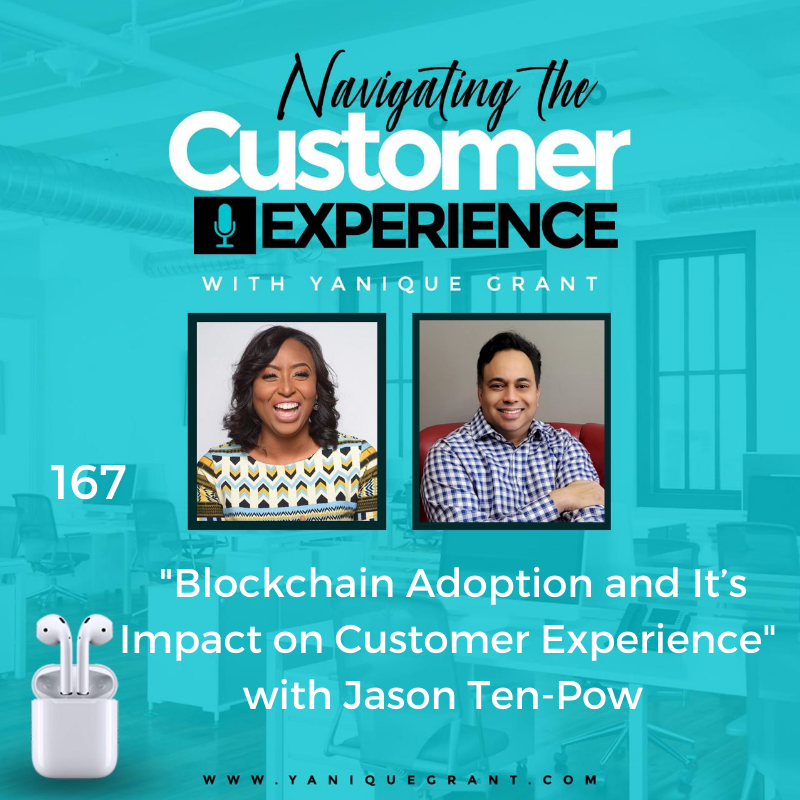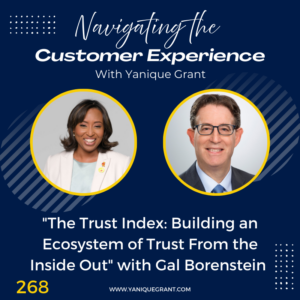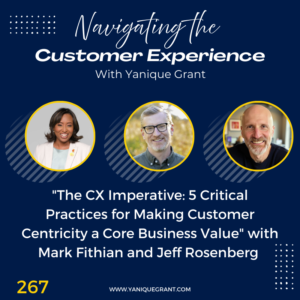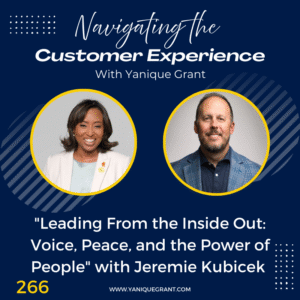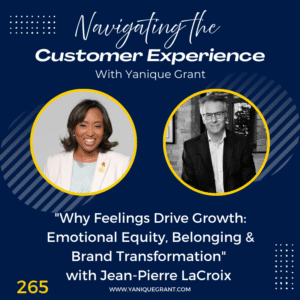We have a return guest Jason Ten-Pow. Jason was on our podcast last year September and he has returned. Jason is the son of immigrants, moved to Canada with his family when he was seven years old. His passion for customer experience was sparked as a teenager while working behind the meat counter of a carnival-themed grocery store in Toronto, Ontario. From there, Ten-Pow co-ran a niche computer technology company, Visionary Enterprises, that built and installed computers and networks.
This venture taught him the basics of running a business and his commitment to customer service sparked the confidence to found ONR, his CX consulting firm in 2001. As the founder and president of ONR, Ten-Pow has expanded his lifelong passion for creating unbreakable customer relationships into an organization with more than 20 years of experience helping renowned brands evolve their customer success stories.
Questions
- What is Blockchain? what are you talking about? So, could you share with us a little bit about what Blockchain is and how that even can impact customer experience?
- Could you give me in real life terms like, I’m a business; let’s say, for example, I own a retail outlet, how does Blockchain affect me, I’m selling stuff online, I have a retail store where customers can come in face to face. What does that mean for my customers?
- Who do you see adopting Blockchain in terms of customer?
- Could you expound for us as it relates to data transparency and consumer loyalty?
- Could give them maybe one or two CX tips that you think will allow them to really connect with their customers, build better and stronger and deeper relationships. What would those two tips be for 2022?
- Could you share with our listeners, what’s the one thing that’s going on in your life right now that you’re really excited about? Either something you’re working on to develop yourself or your people.
- Where can listeners find you online?
- Do you have a quote or a saying that during times of adversity or challenge, you’ll tend to revert to this quote, it kind of helps to get you back on track if for any reason you get derailed? Do you have one of those?
Highlights
What is Blockchain?
Me: So, we’re having Jason back on our podcast. As I mentioned, he was here with us last year September talking about his book Unbreakable: A proven process for building unbreakable relationships with customers. And today he’s here to share with us a little bit about his release that was released earlier this month. The title of the article was Wider Blockchain Adoption Will Impact Customer Experience. And so, my question to you Jason is for those persons that are listening to me are probably saying to themselves, what is Blockchain? what are you talking about? So, could you share with us a little bit about what Blockchain is and how that even can impact customer experience?
Jason stated that Blockchain can be many things, but at its core, it’s the ability of information to be transferred either by the customer or by a product. So, information is tagged and carried along a pathway that can be picked up and shared, but it’s also a very secure way of sharing information. And at its core, the value or the benefit for businesses is that it allows them to acquire a lot more information about their customers and more holistic information about the customer. And for the customer, the benefit is they can have a much better understanding of the product itself, where it was created and where it was manufactured and how it ended up in their hands.
So, Blockchain is really about a safe way of transmitting information back and forth amongst various sources. And the benefit for CX is that it allows businesses to have to acquire much deeper knowledge about its customers. And for the customer, it allows the customer to understand the product they’re purchasing, and where it came from in a much more deep and meaningful way.
And this is exceptionally important today because, well, you think of movements such as ESG, which is Environmental Impact, Social Responsibility and Governance, which is very important considerations for customers that are purchasing a product, it’s good to have an understanding of who’s manufacturing, where this product is from, and if it was manufactured in an environmentally, with minimally environmental impact, and in a socially responsible manner. And so, these are very important bits of information that are being transformed.
How Does Blockchain Affect a Retail Outlet Owner?
Me: All right, now, you kind of gave us the book definition just now of Blockchain. Could you give me in real life terms like, I’m a business; let’s say, for example, I own a retail outlet, how does Blockchain affect me, I’m selling stuff online, I have a retail store where customers can come in face to face. What does that mean for my customers?
Jason stated that what that means for your customers is that you have a lot more information about your customers when they make a purchase. And you’d mean, not just simply their transaction information, but you can have depending on what’s in that Blockchain, you can have much deeper information like their age, if they share that with you, like a whole host of very important demographic information that is now connected to the actual purchase of the product, which allows you to know the customer in a much deeper way, in a much easier manner than you’ve ever been able to before.
Me: Now, what are some of the industries that you see adopting this new method of payment?
Jason stated that it’s funny, he thinks any industry that is transacting online, this will be huge for, financial institutions are going to be right on top of this, retailers are going to really care about this. Why? Because it’s an easier way to acquire knowledge, and to know your customer. Now, for example, the types of customers that will care about this, especially customers that are trying to be socially responsible, making sure that their products that they’re purchasing are having minimal negative impact on the environment, or that the company that’s building this product is being inclusive in their hiring practices, all this type of information can be shared across this Blockchain.
And so, at the end of the day, that’s the overall sort of long-term benefit. Now, we’re right in the infancy of this new technology so that’s what’s very exciting. But at the same time, we’re seeing a lot of changes in how customers make decisions, where price used to be the primary drivers, and even for companies, revenue used to be their sort of main goal that they wanted to achieve. Now you’re seeing much wider, sort of the range of metrics that companies measure themselves against for success, including things like environmental impact, social responsibility, and governance, which the short term for that is ESG, which is a really hot topic right now, because customers are very interested in understanding the impact their products are having, both socially and on the environment.
Customers Who Are Adopting Blockchain
Me: Now, in your release, you had mentioned that Blockchain Adoption has highlighted some customers, how some customers are looking for new different offerings, it’s new, and you know for example, as it relates to the different types of buying personas, if that’s the best way to describe it, you will have like the millennials, you have the Gen z’s, who do you see adopting in terms of customer base because for example, I don’t see my mom engaging in this.
Jason stated no, absolutely. This is definitely for the next generation. We know the up-and-coming generation, the young folks, they are much more cognizant of the environment, and of social justice and equality and those are the customers and the ability to have this information will really benefit, not only because they’re more likely to purchase online, but also because they care about these things when they’re making the purchase decision much more so than previous generations have.
Me: Okay, and when you say they care, is that kind of tying back into where you said, emotion will now take an even larger role in decision making all because of the fact that they’re concerned about equality, justice, fairness, those are things that are high on reasons why they buy from a company?
Jason agreed. You better believe it. You’re absolutely right. And what we’re seeing more and more today is that it’s not simply a price comparison, a lot of the products that the younger generation are purchasing, there’s deep reasons behind why they’re purchasing that’s very different than previous generations. And so, absolutely, that’s a huge selling point. And that’s just literally where the marketplace is going in the future, because at the end of the day, why do companies care about ESG? It’s because the customers are demanding that brands be socially responsible, take care of the environment and that has to be taken into account when you’re looking at whether your brand is profitable or not.
Data Transparency and Consumer Loyalty
Me: Now, you also mentioned in your article that there in this whole process, it’s important for the companies to adhere to industry regulation and improve supply chain management and there are three things that you touched on industry regulation, data transparency, and consumer loyalty. Could you expound for us as it relates to data transparency and consumer loyalty?
Jason shared that this is where you intersect a lot of different new trends that we’re seeing. So for example, if you want to be considered environmentally friendly, the government has set up regulations and standards of which to measure your level of environmental impact the company’s having, and in the USA, it’s now starting to roll out and become more adhered to. However, other standards around for example, social responsibilities really haven’t been set. So, how you measure a brand’s level of social responsibility is really up in the air.
And so, right now you’re having different ways of measuring it. But what is going to happen eventually, is that there’s going to be a standardized way of measuring it and this is where it comes back to customer loyalty. Because if these customers care about these things, they’ll be looking at these indicators to understand how the brand they want to purchase from measures up across these very important dimensions.
Me: I get you. So, it’s all connected. And then the general supply chain, how does that tie back in?
Jason stated that supply chain exactly, where are your products coming from? Is it being manufactured in a place that is not setting socially responsible markers for how they treat employees, there’s in terms of wages, in terms of environmental protection in all of these different areas. So in the past, a company could afford to just measure where they’re going to manufacture a product simply on which is the cheapest location – that is going to change as well. Because if that information becomes freely available, customers will be thinking, “You know what, I don’t want to purchase this shirt that’s made in this part of the world where they’re using child labour. I would prefer to pay a few dollars more to purchase it from a brand that’s socially responsible.” Does that make sense?
Me: Yes, it does, it totally does. But it also, I think, will require a lot of research on the part of the consumer or the way how the Blockchain system is set up now, they will be able to delve and capture that information readily when they’re making the purchase.
Jason stated that that’s the future and that’s the sort of Holy Grail is to be able to look at the product, scan this code, be able to understand exactly where all this information about the product and it’s all at your fingertips. So, the customer can make a much more informed decision than they ever have been able to do before.
Me: Over the years I’ve definitely seen customer experience evolve, at one point, if you look back at how customers made decisions before, it was heavily driven by what the organization told them, especially before the age of the internet where you could do your own research. And it’s like the tables have totally turned Jason where I mean, the ball is fully and even more so as you mentioned, this new technology, this new way of decision making, as we go forward, it’s even more in the court of the customer, because the customers are given so much more ammunition now and they should be, because at the end of the day, they’re the ones that are opening their wallets, and spending to create these astronomical profits for these organizations globally. So why not put the decision-making capability in their hands, so they can really make a choice for the product or service that they want to purchase holistically.
Jason agreed, absolutely. And what it’s going to put a lot of pressure on companies to really deliver a bespoke customer experience that’s unique to the needs of every customer, so it will be slightly different. Why? Because that’s what customers are going to demand, “You’re going to care about the things I care about, right? And you’re going to tell me exactly how you are manufacturing these things, and you’re going to deliver a shopping experience the way I want a shopping experience to be delivered.”
And what that allows companies is to actually be able to build a more customized experience, because they will have that information readily available. And so, the transparency that will be possible will benefit both the brands if they take advantage of it. But it’s definitely going to put a lot more power in the hands of the customer especially because it’s exactly you said, knowledge is power and the more knowledge the customer has, the more informed decision they can make.
CX Tips That Will Allow Businesses to Connect and Build Better and Deeper Relationships with Their Customers
Me: Now, Jason, I know the first quarter of the year has passed, but we’re in the beginning of the second quarter. But could you give our listeners maybe one or two CX tips that you think, outside of this new technology, because as you mentioned, it’s still in its infancy stages, but let’s say where they are currently in their business, they’re just not there yet clearly. But they’re looking to ensure that they employ maybe the best, if you could give them maybe one or two tips that you think will allow them to really connect with their customers, build better and stronger and deeper relationships, what would those two tips be for 2022?
Jason stated that 2022 is the year of Listening and here’s why, the marketplace has changed coming out of the pandemic, customers have different expectations for shopping and purchasing experiences and it’s different than ever before. And the customers are really going to dictate how they want to shop and how they’re going to purchase moving forward. There’s a lot of companies out there that are just thinking to themselves, “Oh, I’m just going to hold out until we get back to how things were before.” And the truth of the matter is, things are not going to go back to how they were before, things have changed, and they are different.
And unless you start listening more closely to your customers in every interaction, whether you’re a restaurant listening to your patrons and their feedback in terms of what they want, and how they want it delivered, to major brands who are selling investments in ESG, stocks and ETFs, all and everywhere in between.
If you’re not listening to your customers and understanding how their wants, needs and desires have evolved, you are going to be left behind and that is really his encouragement to companies coming out at the pandemic to start listening to your customers more closely than you ever have before. Because their opinions and their values have changed.
Me: I’ve heard some organizations say that they think customers are way more sensitive, they complain about the least little thing since the pandemic, what are your thoughts on organizations that view their customer feedback as customers being too sensitive and it’s almost like they’re not open to being flexible or being adaptable to take the feedback that the customer is giving them.
Jason shared that it’s funny, the brands that they work with that they hear this from are brands that are stuck in the past. And he often hears, “This is the way we’ve always done it.”
And so, those are the brands that that may have been the way you’ve done it in the past, but if you don’t change your focus from short term financial, quarter over quarter goals, to a longer-term view of what success really means beyond just simply your short-term financial metrics, you’re going to be in big trouble. And this is really the tug of war that’s going on, it’s the old sort of dynamic of, okay, near term profits at any cost versus taking a longer view of your brand, and your brand’s health. And let’s be honest, public corporations are the ones that have been most guilty of that and those are the ones that he believes are going to be at biggest risk if they don’t adapt themselves to the evolving customer.
What Jason is Really Excited About Now!
Jason shared that they’re working to develop a better understanding of the impact ESG is going to have on decision making over the next 12 to 24 months. So, over that time, they’ll be speaking to investors and customers, as well as business leaders to understand who is driving from an organizational point of view, interest in ESG. And what measures companies are taking to implement tactics that address customers ESG concerns? And how important is ESG becoming in the decision making of customers? So, those are the three angles they’re looking at. And so, it’s going to be quite interesting, because he thinks what we’re talking about Blockchain is just one aspect of the bigger evolution that’s taking place.
And so, it’s going to be interesting to see how these things evolve together, because there’s still many that think that this is a fad, it’s going away. They’re betting against that, they’re saying no, these things are here to stay, and these are the changes in evolution and how business is being conducted. So, it’ll be interesting to see what business leaders are thinking in terms of these new and various approaches to thinking about the company’s success.
Where Can We Find Jason Online
LinkedIn – Jason Ten-Pow
Website – www.onrcx.com
Quote or Saying that During Times of Adversity Jason Uses
When asked about a quote or saying that he tends to revert to, Jason stated yes. First thing is, “Stop” whatever you’re doing stop, take a deep breath. If you have a big problem, the first thing you want to do is you want to cut that problem into smaller chunks that are manageable, that are solvable, and then create a pathway ahead, don’t just see a problem and dive in and try to solve it. Because that’s the biggest issue that companies and that’s why they hit the wall, “Oh, I want to improve customer experience. Great. I want this metric up 10%. Let’s throw money at the wall and see what sticks.” No, that’s never the right approach. You have to take a very strategic approach to these types of problems and these types of challenges, and you have to always have a plan. So, make sure you stop and take the time to plan.
Please connect with us on Twitter @navigatingcx and also join our Private Facebook Community – Navigating the Customer Experience and listen to our FB Lives weekly with a new guest
Grab the Freebie on Our Website – TOP 10 Online Business Resources for Small Business Owners
Links
- Unbreakable: A proven process for building unbreakable relationships with customers by Jason Ten-Pow
The ABC’s of a Fantastic Customer Experience
Do you want to pivot your online customer experience and build loyalty – get a copy of “The ABC’s of a Fantastic Customer Experience.”
The ABC’s of a Fantastic Customer Experience provides 26 easy to follow steps and techniques that helps your business to achieve success and build brand loyalty.
This Guide to Limitless, Happy and Loyal Customers will help you to strengthen your service delivery, enhance your knowledge and appreciation of the customer experience and provide tips and practical strategies that you can start implementing immediately!
This book will develop your customer service skills and sharpen your attention to detail when serving others.
Master your customer experience and develop those knock your socks off techniques that will lead to lifetime customers. Your customers will only want to work with your business and it will be your brand differentiator. It will lead to recruiters to seek you out by providing practical examples on how to deliver a winning customer service experience!

